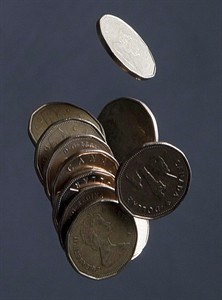
The Canadian dollar (loonie) is pictured in Vancouver, B.C. Thursday, Sept. 22, 2011. THE CANADIAN PRESS/Jonathan Hayward
July 20, 2012 - 8:42 AM
OTTAWA - Canada's annual inflation rate rose slightly to 1.5 per cent last month, but most consumer prices stayed well in check and there were few signs of building cost pressures in any region of the country.
Statistics Canada said increases in the price of passenger vehicles, electricity, food, and homeowners' replacement costs were mostly responsible for June's slightly higher inflation rate, which was up three-tenths of a point from May.
Economists had actually projected an even greater uptick given May's extremely low reading of 1.2 per cent.
But they also cautioned that most of the increase would be temporary, caused by unusual base-effects from a year earlier when gas prices were receding and auto dealers launched an aggressive program of discounting.
The agency noted that discounting occurred this June as well — with car prices 2.7 per cent lower than they were a month earlier — but less so than happened a year earlier.
As well, gasoline prices continued to trend downwards this June by 3.2 per cent from May, but not as sharply as occurred last year at this time.
A truer picture of the inflation trend was reflected in the monthly measure, which saw the overall price of consumer goods and services Canadians regularly purchase fall by 0.4 per cent from May.
Earlier in the week, the Bank of Canada said it expects overall headline inflation to remain below its two per cent target for about a year.
The central bank's other measure — core inflation, which excludes volatile items like energy and fresh vegetables and fruit — bore monitoring as it rose two-tenths to two per cent, but still dead on the bank's target line.
The key stand-out in Friday's report was that the cost of electricity rose by 5.9 per cent from last year, with most of the increases in Ontario, Alberta and British Columbia.
But the agency noted that even with this sharp increase, the energy component declined 0.8 per cent in the 12 months, following a decrease in May.
In fact, for the second consecutive month, energy costs acted as a drag on annual inflation, which had not been the case since October 2009. Excluding that segment, the overall consumer price index would have risen to 1.7 per cent in June, the agency said.
On an annual basis, food rose two per cent, transportation costs by 1.7 per cent and shelter costs increased 1.3 per cent.
On a monthly basis, natural gas, fresh vegetables, financial services, electricity and hotel accommodation all cost more than in May. But cars, clothing, gas, non-alcoholic beverages and mortgage interest charges cost less.
Regionally, there were no price hot-spots as the inflation rate ranged from a high of 2.2 per cent in Newfoundland and Labrador, to a low of 1.2 per cent in Ontario.
News from © The Canadian Press, 2012